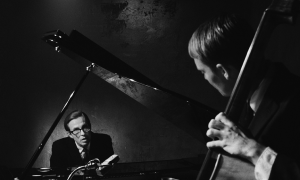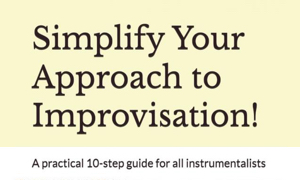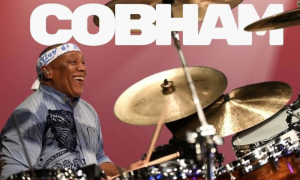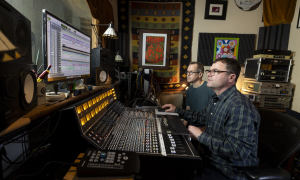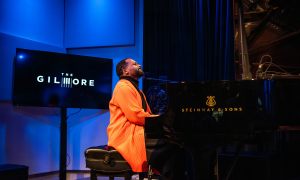Like jazz (or any form of music), there's good and bad disco. Most disc jockeys today who reach back into the disco vaults to freshen up recordings fail miserably. Their big mistake is either choosing badly or taking what were exciting works and corrupting the music's infrastructure with the addition of drawn out and sterile techno-beats and dubs. These misguided DJs and studio wizards are digitally proficient, but they lack the passion, taste and care needed to polish any disco gem. For example, just listen to the lackluster mess called Motown Remixed.
Which is why I was blown away last week when I heard the new double CD Get Down With the Philly Sound, presented by Dimitri From Paris. Dimitri is Dimitris Yerasimos, a French DJ and remix wonder who was born in Turkey in 1963. What sets Dimitri apart from his peers is a tireless passion for the music, a scholar's knowledge of its history and a keen sense of what makes this material exhilarating. His choice of tracks exhibits maturity, and what he does with (or to) the songs gracefully teases out each one's delicate emotional gimmick. He's like the pastry chef who doesn't have to destroy the original pleasures of the mille-feuille to update it. Among Dimitri's successful past mixes are A Night at the Playboy Mansion and My Salsoul.
Get Down With the Philly Sound features two CDs--one with the original disco tracks and the other with the same tracks remixed. What's remarkable here is that Dimitri has made each one work, resulting in versions that are actually better than the originals. Each track was a smart choice and each remix is handled with respect. The results are more colorful renditions that pulsate with a new vibrant urgency.
For example, dig Harold Melvin's The Love I Lost. You won't believe what Dimitri did to this dance-floor staple. I've always believed the original version, which ran 6:23, felt a little short. Dimitri works wonders here by teasing out Teddy Pendergrass' vocal and colorizing the song's hustle beat, resulting in a new mix that clocks in at over 11 minutes. Dimitri does the same with the other tracks, including Harold Melvin's Bad Luck, Teddy Pendergrass' The More I Get the More I Need, The Jacksons' Living Together, and the Trammps The Night the Lights Went Out, a disco tribute to the New York City blackout of 1977. The only small change I would have made is sequencing Bad Luck right after The Love I Lost, but this is hardly an issue since you can do this yourself once imported into iTunes.
If you dig Philadelphia soul and disco, this album is a must. It's my favorite disco discovery since Curtis Mayfield Remixed, Diana Ross & the Supremes Remixes and Cerrone by Jamie Lewis. In fact, Get Down With the Philly Sound tops them all. I just hope Dimitri gets around to revitalizing Tavaras' Watchin' the Woman's Movement, Crown Heights Affair's Dreaming a Dream, David Ruffin's Walk Away From Love, the Trammps' Can We Come Together, Double Exposure's Ten Percent, Archie Bell's I Could Have Danced All Night, The Ritchie Family's Brazil, Jakki's Sun Sun Sun, Suzy Q's Get On Up and Do It Again, Candi Staton's Victim, and Cerone's Love in C Minor (without the drawn-out female commentary in the intro, please).
I don't know Dimitri and have never spoken with him. I just dig good disco and disco mixes where the sonic qualities are leveraged carefully. Bravo, Dimitri!
JazzWax tracks: Dimitri From Paris' Get Down with the Philly Sound is available as a CD here. It's not available yet at iTunes in the U.S. but I'm told it will be soon.
JazzWax clips: Here's Part 1 of a video-documentary supporting the album's release...
And here's Dimitri's reverential remix of Harold Melvin & the Blue Notes' The Love I Lost, a glossy and soulful updating of a classic that celebrates vocalist Teddy Pendergrass. Crank up your system. The whole second CD is like this...
This story appears courtesy of JazzWax by Marc Myers.
Copyright © 2026. All rights reserved.







